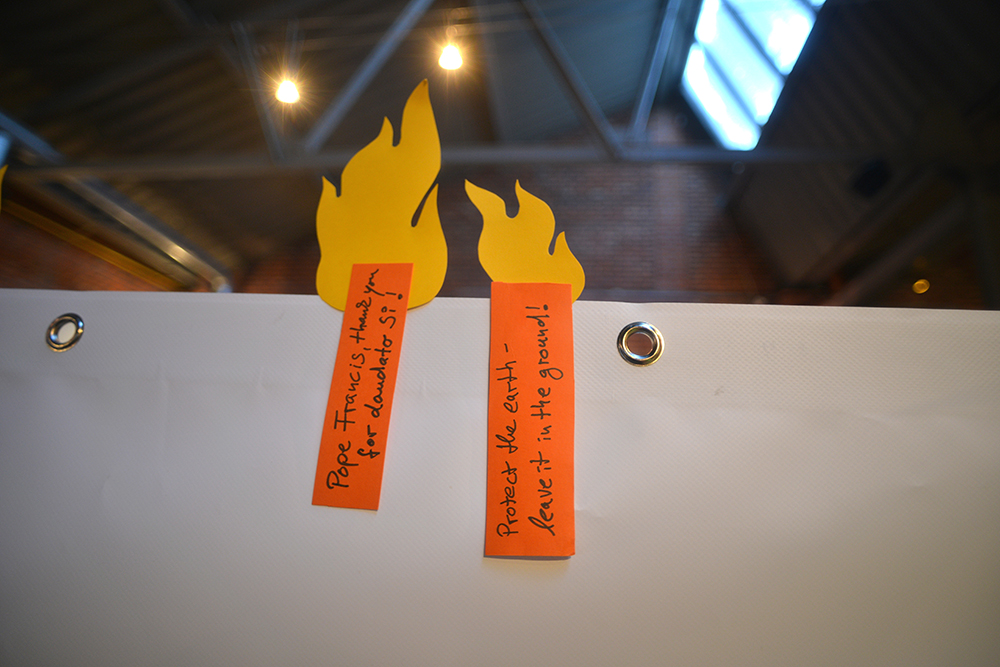Fossil Free
Step 4:
Engage Your Decision Makers
Step 5 Keep The Conversation Going Step 6 Win And Get The Word Out Divestment Arguments Help Making Your Case Contacts Where To Go For Help Print This Guide Coming soon!e
Build Relationships
Meaningful change begins with relationships. In practice, much of the work in divesting from fossil fuels is in building support for divestment among decision-makers in the target organization. This process takes time. It requires at least one person, but ideally a number of people, to talk with people and encourage a different way of thinking about ethical investing.
- Pray for a good outcome. One important relationship is with God. It will be a source of strength and creative energy to spend time in prayer for an outcome which will be positive for creation and all dependent on her.
- Seek out supporters. Consider what committees in your community or organisation are concerned with issues related to the environment, economic justice, poverty, racism, and other social justice issues. If you don’t know of these types of committees, ask someone who would know. Attend meetings and events that might help you connect with them. In some cases people who are passionate about environmental issues may not be connected with any particular committee. A great way to meet these types of people is to be really friendly after Mass and at events, and to talk openly about your concern for the environment. Once you have identified people who might be interested in this issue, invite them to an informal meeting to further explore the possibility of starting some advocacy for a decision by the organisation to divest from fossil fuels.
- Get to know those who are responsible for decisions in your organisation. The planning process will have helped you to identify who the key decision makers are and understand more about the decision making process as well as how you can influence it. It is often wise to direct your advocacy for change to those who can make decisions based on ethical principles, rather than to a bursar or finance committee. Those with direct responsibilities to implement investment decisions tend to be influenced by dominant norms around responsible investment in the finance sector. Changes to the way they operate can be viewed as risky and/or too time-consuming and/or beyond their expertise.Try to build individual relationships with relevant decision-makers or those who are in a position to influence them. There are strong moral and financial arguments for divestment, and you can find more information about each of them in ‘Divestment Arguments‘. In many cases, those who make decisions on behalf of a faith community are balancing competing issues and concerns. Identify your shared values, as well as areas of disagreement. Try to understand their perspectives and intentions, honoring the challenging nature of their work, even if you disagree with them.
- Connect with other people in the Catholic tradition and in other networks who are considering fossil fuel divestment. Hundreds of faith communities, denominations and other religious institutions worldwide are engaged in fossil fuel divestment campaigns with many resulting in commitments to divest. Connecting with others who do this work will help you cultivate ideas, gather tips, and build excitement and solidarity.
What are we asking for?
The Fossil Free campaign calls on organisations to commit to:
- Immediately freeze any new investment in the top 200 publicly-traded fossil fuel companies
- Divest from direct ownership and any commingled funds that include fossil fuel public equities and corporate bonds within 5 years
These top 200 companies (identified by Fossil Free Indexes Carbon Underground 200 project) represent the vast majority of fossil fuel companies and have been useful for setting asset exclusion criteria. Because many of these products are quite complicated or have fixed contract periods, 5 years has been identified as a practical and financially prudent deadline to work towards.
Top Tips
- There will be people on your side – identifying them early on and working with them is crucial.
- In many cases the institutions you’re working with will have commitments to act on climate change, and it’s worth flagging these up in your correspondence. The more relevant you can make the pitch to your institutions the better.
- You may need to tailor your arguments depending on who you’re talking to. Some people may respond better to the moral case, others to the financial.
- You don’t need to be a financial expert (there are people and resources that can help!), and you’re not there to give financial advice. This glossary explains the key financial terms.
- Backroom negotiations work best when you’ve got a loud and public divestment campaign and public support to point at, so don’t get too bogged down in negotiations
- These FAQs should help answer tricky questions from decision makers.
Getting divestment on the agenda:
- Meeting up with decision makers individually to get them onside – finding and working with allies is crucial (especially as they’ll have to put things on the agenda).
- Asking ‘influencers’ to approach decision makers on your behalf.
- Attending public meetings with decision makers and asking questions.
- Providing divestment briefings (there are some great examples from other campaigns here) and speaking at any public meetings.
More information about the decision making processes in local government can be found in the Local Government Divestment Guide, and there’s a wealth of knowledge about other sectors through partner organisations and campaigns.
They may not say yes straight away, but… Keep going! There are lots of people in the same position that you can talk things through with.
